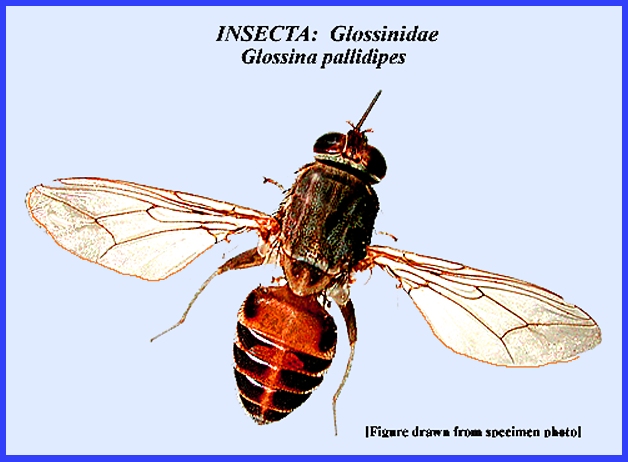File: <rhodesiansleepingsickness.htm> <Medical Index> <General Index> Site Description Glossary <Navigate
to Home>
|
RHODESIAN SLEEPING SICKNESS (Contact) Please CLICK on
image & underlined links for details:
Important
vectors are Glossina morsitans, G. pallidipes and G. fuscipes, which draw
blood from a variety of game and domestic animals. The flies occur primarily in wild areas that are not heavily
populated by humans. Reservoir hosts
are the many wild bovid animals present (e.g., black buffalo, etc.). = = = = = = = = = = = =
= = = = = = = = Key References: <medvet.ref.htm> <Hexapoda> Buxton, P. A. 1955. The Natural History of Tsetse Flies: an
Account of the Biology of the Genus Glossina
(Diptera). London School of Hygiene & Trop. Med. Memoir 10, London Colvin, J. & G.
Gibson. 1992. Host-searching behavior and management of
tsetse. Ann. Rev. Ent. 37: 21-40. Fevre, E. M., K. Picozzi, J. Jannin, S. C. Welburn
& I. Maudlin. 2006. Human African trypanosomiasis epidemiology
and control. Adv. Parasitol. 61: 168-221. Ford, J. 1971.
The Role of Trypanosomiasis in African Ecology: a Study of Tsetse Fly Problem. Clarendon Press, Oxford. Gooding, R. H. & E. S. Krafsur. 2005.
Tsetse genetics: contributions to the biology, systematics and control
of tsetse flies. Ann. Rev. Ent. 50: 101-23. Green, C. H. 1994.
Bait methods for tsetse fly control.
Adv. in Parasitology 34:
229-91. Jannin, J. & P.
Cattand. 2004. Treatment and control of human African
trypanosomiasis. Current Opinions in
Infectious Diseases 17: 565-71. Jordan, A. M. 1989. Man and changing patterns of the African
trypanosomiasis. IN: Demography &
Vector-Borne Diseases. CRC Press, Boca Raton, Fla. p. 47-58. Jordan, A. M. 1993.
Tsetse-flies (Glossinidae).
IN: Medical Insects and
Arachnids. Chapman & Hall, London.
p. 333-88. Matheson, R. 1950. Medical Entomology. Comstock Publ. Co, Inc. 610 p. Maudlin, I., P. H.
Holmes & M. A. Miles. 2004. The Trypanosomiases. CABI, Wallingford, England. Service, M. 2008.
Medical Entomology For Students.
Cambridge Univ. Press. 289 p Torr, S. J., J. W.
Hargrove & G. A. Vale. 2005. Towards a rational policy for dealing with
tsetse. Trends in Prasitology 21: 537-41. Legner, E.
F.
1995. Biological
control of Diptera of medical and veterinary importance. J. Vector Ecology 20(1): 59_120. Legner, E. F. 2000.
Biological control of aquatic Diptera. p. 847_870.
Contributions to a Manual of Palaearctic Diptera, Vol. 1, Science Herald, Budapest. 978 p. World Health Organization. 2003. Report of the
Scientific Working Group Meeting on African Trypanosomiasis (Sleeping
Sickness). TDR/SWG/01, Geneva.
|
